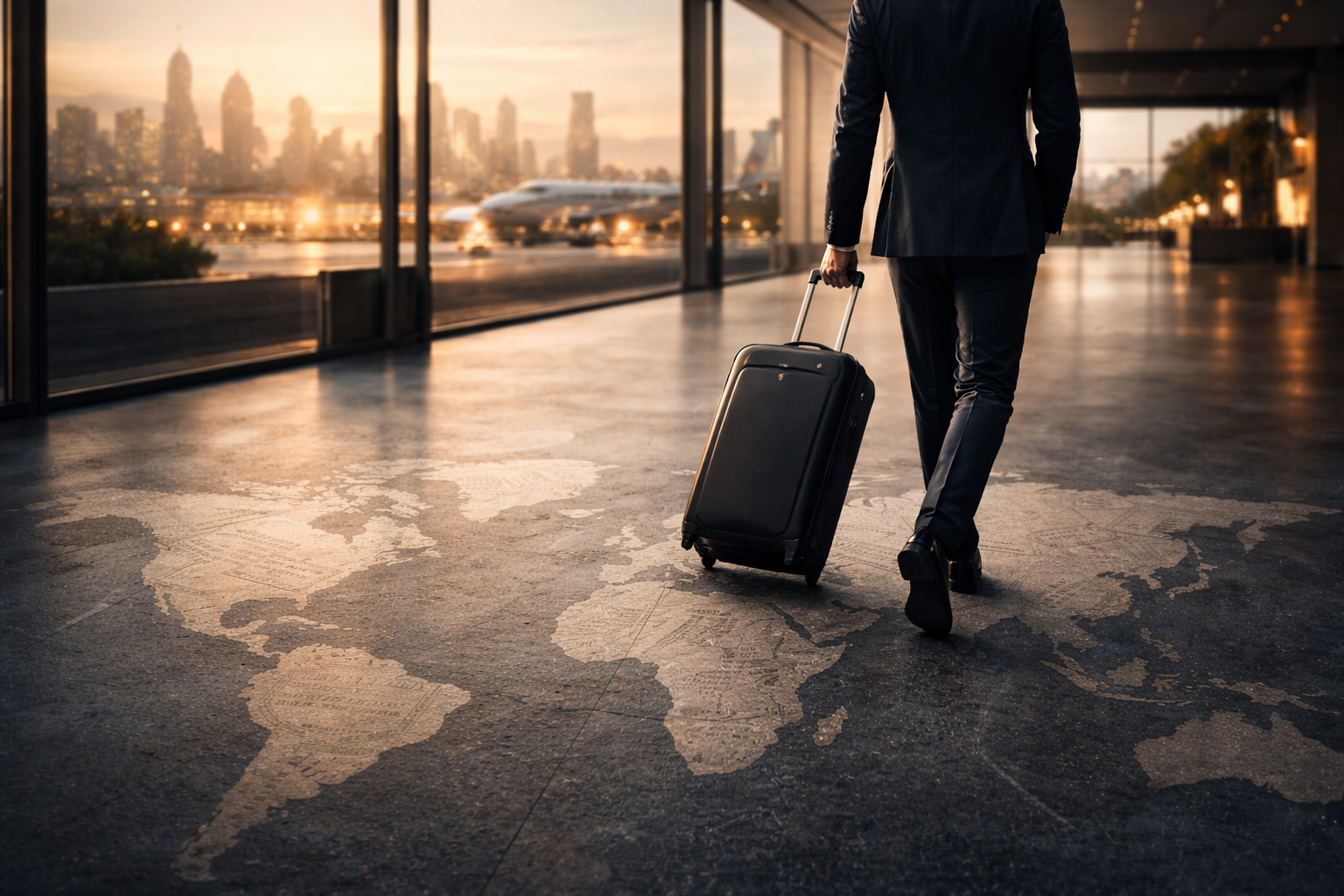Wealth Migration: Why Billionaires Are Getting New Citizenships

- The Great Wealth Migration
- Nikolay Storonsky (CEO of Revolut)
- Travis Cordell Kalanick (former CEO of Uber)
- Eric Schmidt (Former Google CEO)
- Peter Thiel (Co-founder of PayPal)
- Kevin O'Leary (TV Personality & Celebrity Investor)
- Patrick Drahi (Billionaire Investor)
- Roman Abramovich (Famous Oligarch)
- Eduardo Saverin (Facebook Co-Founder)
- Why Are The Wealthy Moving Abroad?
- Wealth Migration: Current Trends
- Second Citizenship Opportunities
- Wealth Migration FAQs
We called this website Millionaire Migrant to reflect the growing trend of wealthy investors moving their wealth offshore.
Now this process has begun to accelerate, with a growing number of millionaires – and billionaires – moving to tax-friendly jurisdictions like Dubai.
We are also seeing a spike in interest in second citizenships, driven by an increasing number of high-profile cases involving celebrities, business leaders and tech CEOs.
So, in this article, we look at some of the wealthiest, to see where they moved to, what their motivations were and the methods they used.
The Great Wealth Migration
We’re currently witnessing one of the greatest migrations of wealth in a generation.
Tax-friendly countries like UAE are the clear winners, while Western countries lose out.
As this article shows, wealthy individuals use tax residency and citizenship diversification as a hedge against future uncertainty.
The more that uncertainty rises, the more high-profile cases we see in the news.
Worst affected is the UK, which is currently haemorrhaging wealth at alarming levels as high-net-worth individuals flee Britain in search of greater prospects.
It’s much the same in North America, with a growing number of people leaving the US permanently.
While US politics certainly is a factor here, it’s not the primary one, since emigration trends in neighbouring Canada are virtually identical.
But here’s the most alarming part. Until recently, China and India saw some of the highest levels of wealth migration.
And where did these wealthy emigrants go? Traditionally, they went to the UK, US and Canada, but now they’re going to tax-friendly countries like Dubai and Singapore instead.
What’s more, wealthy foreigners living in the West – previously the very embodiment of immigrant success stories – are also leaving in increasing numbers, in favour of more stable economies, business-friendly governments and wealth-friendly tax systems.
This is having a snowball effect, and while it has not yet reached critical mass just yet, the momentum is certainly growing daily.
Already we have a situation whereby wealthy individuals from abroad who, in part at least, made their fortune in the UK, have begun offloading their London property.
Only a few years ago we would have considered this rash and impulsive, but now it’s become business as usual.
As always, the most successful in business are those who stay ahead of the curve.
Nikolay Storonsky (CEO of Revolut)
The latest high-profile exodus making headlines is that of Revolut CEO and co-founder Nikolay Storonsky, who has just moved his residency from the UK to the United Arab Emirates.
Storonsky was born in Russia but moved to the UK in 2004, where he worked in finance.
In 2015, he co-founded Revolut with Vlad Yatsenko, the company is currently valued at $75 billion.
Forbes reports that Storonsky has a net worth of $7.9 billion and holds both British and French citizenship, having renounced his Russian citizenship shortly after the invasion of Ukraine.
The end of the non-dom programme is cited by many (including FT and Forbes) as one of the key factors in the decision, along with a growing frustration with the UK government in general.
Coming at such a critical time, as Revolut seeks to expand its operations further, Storonsky’s exit serves as yet another vote of no confidence for Britain and another huge victory for jurisdictions like the UAE.
Travis Cordell Kalanick (Former CEO of Uber)
While the UAE remains the most popular choice, it is by no means the only country in the region providing refuge to the wealthy.
Recently, the Kingdom of Saudi Arabia granted citizenship to two American businessmen.
The first of whom was Uber co-founder and former CEO Travis Kalanick, alongside John Pagano, CEO of the Saudi-based real estate development firm Red Sea Global.
As these citizenships were granted by royal decree, they can be considered examples of citizenship by exception, a term which, you’ll notice, crops up a lot when discussing the ultra-wealthy.
Eric Schmidt (Former Google CEO)
When Google’s Eric Schmidt wanted a second passport, he simply paid for it.
And, while money certainly was not an issue in his case, we still think he should have spent more time investigating his options.
Unlike the other tech CEOs on the list so far, Schmidt didn’t seem to bother looking into the possibility of obtaining citizenship by exception or, failing that, citizenship by descent.
It’s clear he wasn’t shopping around, nor did he seem to care all that much about where he got his passport from.
As a result, Schmidt obtained a “golden passport” from Cyprus, Europe’s most controversial citizenship by investment programme, just before the programme was shut down.
We’re not sure what Schmidt’s exact motivations were, though enhanced mobility in Europe would be the primary advantage.
So, from this perspective, Schmidt’s Cypriot passport does the job just fine, but if second citizenship is your goal, we still strongly advise you to look at more than one option.
Or better yet, get in touch with our team and we can explore the various opportunities available.
Peter Thiel (Co-founder of PayPal)
Tech billionaire Peter Thiel was born in Germany before his family moved to the US.
He is best known as one of the founders of PayPal and currently has a net worth of $28.5 billion.
In 2011, Thiel made headlines when he was granted citizenship in New Zealand in just 12 days.
Usually, it takes years and comes with strict physical presence requirements, making this another clear case of citizenship by exception.
Thiel now has three nationalities (German, American and New Zealand) much like fellow PayPal co-founder Elon Musk, who has US, Canadian and South African citizenship.
Steve Wozniak (Co-founder of Apple)
Another famous co-founder is Steve Wozniak, who, along with Steve Jobs and Ronald Wayne, founded Apple back in 1976.
In addition to building the foundations for one of the world’s most successful tech companies, “The Woz” is also something of a wizard when it comes to gaining second citizenships.
In addition to obtaining citizenship by descent in Poland (and with it an EU passport), Wozniak was also granted citizenship by exception by the government of Serbia.
Kevin O’Leary (TV Personality & Celebrity Investor)
Known as Mr Wonderful, Kevin O’Leary is a Canadian-born entrepreneur, investor and celebrity with an estimated net worth of $400 million.
As you may guess from his surname, he’s of Irish descent, and so managed to parlay this into a passport by applying for citizenship by descent.
In 2023, O’Leary announced that the UAE had granted him citizenship by exception, due to his work as a brand ambassador for the country.
Patrick Drahi (Billionaire Investor)
Franco-Israeli Patrick Drahi made his fortune in telecoms and broadcasting and is also the majority owner of the international auction house Sotheby’s.
Drahi was born in Morocco to a Jewish family that then moved to France when he was a teen.
He later applied for Israeli citizenship, but didn’t stop there, obtaining Portuguese citizenship in 2015 through a programme designed to repatriate descendants of Sephardic Jews.
For many years, Drahi was a tax resident in Switzerland before moving to Israel in 2024.
Though we don’t know exactly when, Drahi also got a passport from Saint Kitts and Nevis at some point, bringing his total number of citizenships to four.
From Morocco to France, then Israel, Portugal, Switzerland and finally St Kitts & Nevis, Drahi is a truly nomadic billionaire investor, fully aware of the advantages that true global mobility can provide.
Roman Abramovich (Famous Oligarch)
Roman Abramovich is perhaps the most famous of all Russian oligarchs. In addition to his fleet of epic yachts, he is also best known as the former owner of the UK football club Chelsea.
Abramovich was born in the former Soviet Union, in Russia. He retains his Russian citizenship but also obtained Israeli citizenship in 2018.
As with Patrick Drahi, Abramovich applied for Portuguese citizenship via Portugal’s right of return law. Unlike Drahi, however, Abramovich’s Sephardic connections proved more tenuous.
Despite this, Abramovich was granted Portuguese citizenship in 2023, after which the Portuguese government tightened up the rules for returning Jews.
When large cases like these make headlines, the result is often greater scrutiny, prompting governments to tighten regulations. That’s why it’s so important to act sooner, rather than later.
Eduardo Saverin (Facebook Co-Founder)
Eduardo Saverin was born in Brazil before moving to the US with his family in the early 90s.
There, he became a US citizen before attending Harvard, where he met Mark Zuckerberg.
In 2009, Saverin moved to Singapore before renouncing his American citizenship two years later. This allowed Saverin to break free of the IRS and enjoy the full benefits of Singaporean tax residency.
After Dubai, Singapore is one of the most popular destinations for wealthy investors.
It’s also currently home to Chinese billionaire Zhang Yiming, co-founder of TikTok’s parent company ByteDance.
Why Are The Wealthy Moving Abroad?
Simply put, the current migration of wealth is towards countries that offer more opportunity and away from countries which are deemed to have lost their edge.
The prevailing narrative in Britain blames this exodus on the suspension, earlier this year, of the UK’s non-dom tax system. And while this certainly had a huge effect on perceptions of Britain, the truth is more nuanced.
With an economy already battered by Brexit, Covid and a revolving door of prime ministers, the UK is ill-equipped to handle the increased uncertainty from tariffs and other economic challenges.
As a result, HNWI investors are weighing up the pros and cons of remaining in Britain and, increasingly, are finding the pros column severely lacking.
Especially now that the UK’s largest pro, its non-dom tax status, no longer exists.
This grim calculus also applies to the one-time “land of opportunity.”
Again, it’s easy to accept the dominant narrative and blame it all on US politics.
But if that’s the case, how do you explain Canada?
As with many things financial, the real issue is one of perception. There is a growing sense among our clients that the old centres of power are becoming increasingly dysfunctional and hollowed out.
Once seen as centres of commerce and innovation, they now feel stifling and broken, wracked by political squabbling, struggling to remain relevant and unable to prevent the great shift towards a new multi-polar world.
Instead of new ideas, old governments remain stuck, doing more of the same, with more taxes and regulations, more empty promises and more frustration for business owners.
Wealth Migration: Current Trends
- Countries once seen as beacons of opportunity are no longer as appealing to immigrants.
- In terms of HNWI migration, the UK is currently losing the most, while the UAE is gaining the most.
- Emigration from the US and Canada is also on the rise.
- The ultra-wealthy use a range of strategies to obtain multiple citizenships, often combining citizenship by descent, citizenship investment and citizenship by exception.
- High-profile cases can bring more scrutiny, resulting in tighter rules – emphasising the need to apply early.
Second Citizenship Opportunities
While you technically don’t need to have exceptional wealth and power to obtain citizenship by exception, as we’ve seen, it certainly helps.
And it helps, too, when you have people willing to bend the rules slightly to get what you want.
Many of the examples mentioned here were controversial at the time, and for good reason.
But that’s not the real story.
The key takeaway here is that the super-wealthy have an eye for opportunities and actively seek them out.
Diversification is an important consideration in any investor’s portfolio, and increasingly this is being applied to citizenship.
Why? Because it’s the ultimate insurance policy in this increasingly complex world.
Having a second, third or even fourth passport gives you more options. And that’s precisely why so many of the world’s wealthiest people prioritise building a portfolio of passports. It gives them more leverage, which means more power and influence.
But the more high-profile cases like this there are, the more media attention they get, resulting in higher demand and greater oversight.
Opportunities dry up quickly, programmes close, prices rise, and governments add knee-jerk restrictions to existing programmes trying to assuage voters.
These stories also propagate the myth that second citizenship is only for the super-wealthy, when nothing could be further from the truth.
So, it’s worth pointing out again how many of the high-profile billionaires and other wealthy investors mentioned above pursued citizenship by descent options with zero investment required.
It’s not just for the super wealthy; they’re just ahead of the game.
But with the right advice, you can enjoy all the same benefits they do.
Obtaining second citizenship or changing your residence to a tax-friendly jurisdiction allows you to build for your future and that of your family so that you’re secured whatever may come.
But the time to act is now, so get in touch to discuss options today.
Wealth Migration FAQs
What countries are millionaires and billionaires moving to?
Wealth migration trends show an increasing number of millionaires (and billionaires) leaving high-tax western countries such as the US, UK and Canada in favour of more business-friendly, low-tax jurisdictions like Singapore and the United Arab Emirates.
What is causing the increase in wealth migration?
A number of factors are causing the increase in wealth migration, including rising costs (both the of living and cost of doing business), less opportunities, and overall disillusionment with the political climate and government policies.
The latter is particularly true in Britain, where the government’s decision to end its long-running non-dom tax regime has prompted an orderly exodus of wealthy individuals.
The most notable example of wealth defection is that of Revolut CEO Nikolay Storonsky, who has since left the UK to become a resident of the UAE.
What are the most common form of citizenships for the super-wealthy?
For wealthy individuals, citizenship by investment remains the most common form of obtaining second citizenship, though citizenship by descent is also popular as it is a far more cost-effective option.
Increasingly, we are beginning to see more high profile examples of citizenship by exception, whereby citizenship is granted by government decree to exceptional individuals including business leaders, athletes and celebrities.
Which celebrities have second citizenships?
The list of celebrities with second citizenships is growing every day, and includes comedian Jimmy Kimmel who received citizenship by descent, and actors Tom Hanks and Angelina Jolie who both received citizenship by exception.


